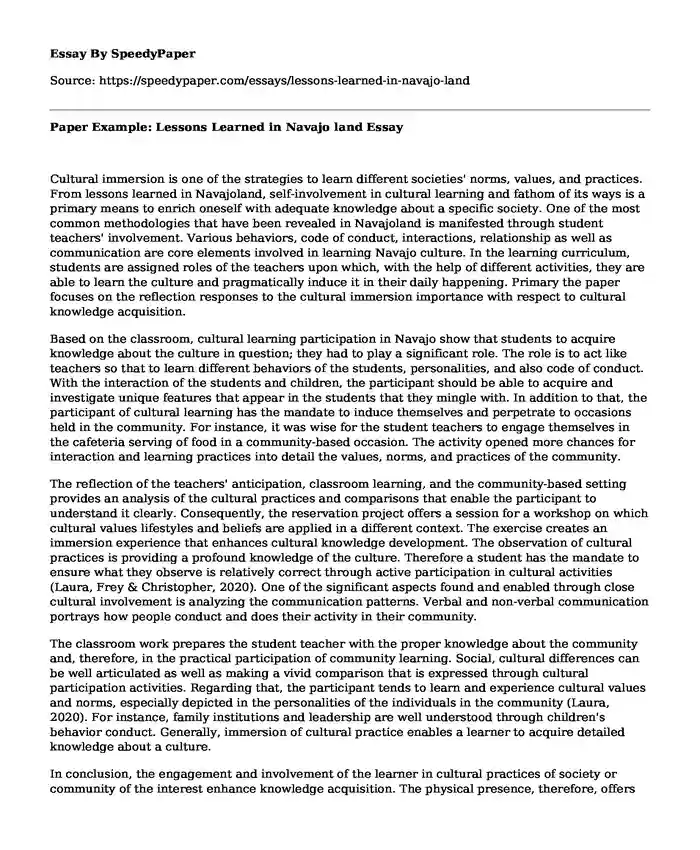Cultural immersion is one of the strategies to learn different societies' norms, values, and practices. From lessons learned in Navajoland, self-involvement in cultural learning and fathom of its ways is a primary means to enrich oneself with adequate knowledge about a specific society. One of the most common methodologies that have been revealed in Navajoland is manifested through student teachers' involvement. Various behaviors, code of conduct, interactions, relationship as well as communication are core elements involved in learning Navajo culture. In the learning curriculum, students are assigned roles of the teachers upon which, with the help of different activities, they are able to learn the culture and pragmatically induce it in their daily happening. Primary the paper focuses on the reflection responses to the cultural immersion importance with respect to cultural knowledge acquisition.
Based on the classroom, cultural learning participation in Navajo show that students to acquire knowledge about the culture in question; they had to play a significant role. The role is to act like teachers so that to learn different behaviors of the students, personalities, and also code of conduct. With the interaction of the students and children, the participant should be able to acquire and investigate unique features that appear in the students that they mingle with. In addition to that, the participant of cultural learning has the mandate to induce themselves and perpetrate to occasions held in the community. For instance, it was wise for the student teachers to engage themselves in the cafeteria serving of food in a community-based occasion. The activity opened more chances for interaction and learning practices into detail the values, norms, and practices of the community.
The reflection of the teachers' anticipation, classroom learning, and the community-based setting provides an analysis of the cultural practices and comparisons that enable the participant to understand it clearly. Consequently, the reservation project offers a session for a workshop on which cultural values lifestyles and beliefs are applied in a different context. The exercise creates an immersion experience that enhances cultural knowledge development. The observation of cultural practices is providing a profound knowledge of the culture. Therefore a student has the mandate to ensure what they observe is relatively correct through active participation in cultural activities (Laura, Frey & Christopher, 2020). One of the significant aspects found and enabled through close cultural involvement is analyzing the communication patterns. Verbal and non-verbal communication portrays how people conduct and does their activity in their community.
The classroom work prepares the student teacher with the proper knowledge about the community and, therefore, in the practical participation of community learning. Social, cultural differences can be well articulated as well as making a vivid comparison that is expressed through cultural participation activities. Regarding that, the participant tends to learn and experience cultural values and norms, especially depicted in the personalities of the individuals in the community (Laura, 2020). For instance, family institutions and leadership are well understood through children's behavior conduct. Generally, immersion of cultural practice enables a learner to acquire detailed knowledge about a culture.
In conclusion, the engagement and involvement of the learner in cultural practices of society or community of the interest enhance knowledge acquisition. The physical presence, therefore, offers not only theoretical knowledge but also a clear elaboration on doubtable instances. It provides first-hand information or the primary data that provides the reality of the culture. Besides, cultural immersion enables the learner to critically analyze the values and norms of a particular community in an unbiased manner. Thus, cultural activity engagement assists a student in developing a good rapport of the community based on its values and beliefs.
Reference
Laura L.; Frey, Christopher J., S. (2020). Lessons Learned in Navajoland: Student Teachers Reflect on Professional and Cultural Learning in Reservation Schools and Communities. Retrieved from https://www.tandfonline.com/doi/abs/10.1080/01626620.2003.10734441
Cite this page
Paper Example: Lessons Learned in Navajo land. (2023, Mar 29). Retrieved from https://speedypaper.net/essays/lessons-learned-in-navajo-land
Request Removal
If you are the original author of this essay and no longer wish to have it published on the SpeedyPaper website, please click below to request its removal:
- Free Essay on How Technology Has Enhanced Education
- Essay Sample on History of Florida
- Free Paper Sample on a Feminist Overview of the Salem Witch Trials
- Essay Example: Analysis of the Country and the Political History
- Essay Sample: The Role of Sustainable Interior Design in Nigeria's Economy
- Free Essay: Clock Drawing Test (CDT) Assessment
- Report Sample on Cross-Cultural Communication for Law Enforcement
Popular categories





